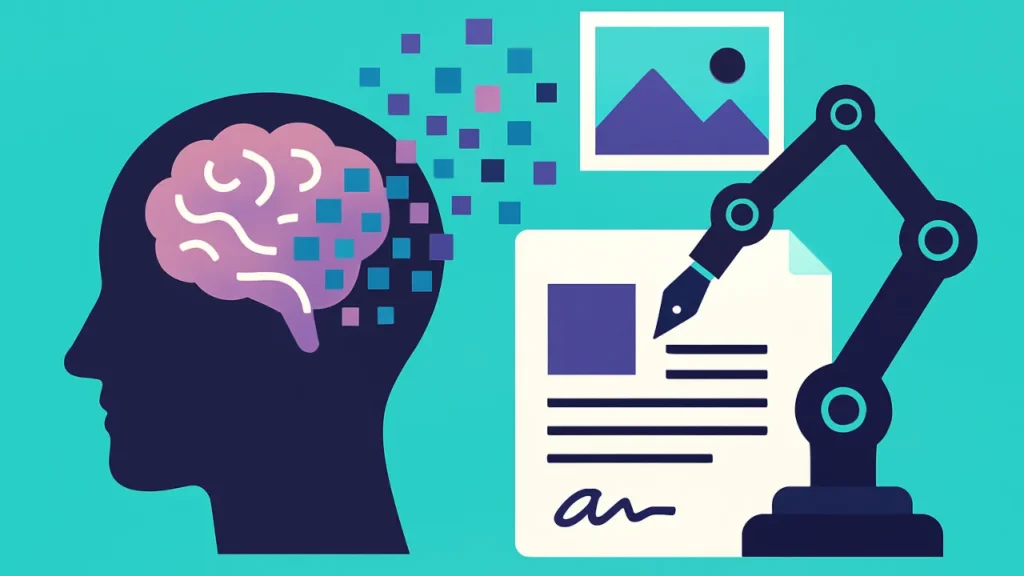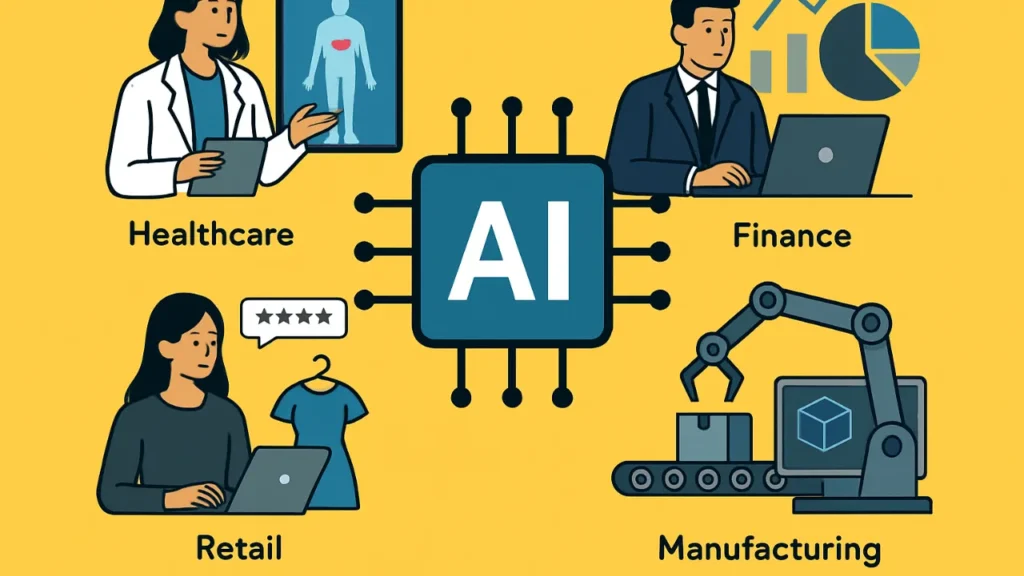With its numerous applications that have the potential to transform entire industries and propel advancement, artificial intelligence is incredibly significant in today’s world. Organizations can make more intelligent, data-driven decisions due to its capacity to process enormous volumes of data and extract insightful information.
Businesses can now automate repetitive tasks, increasing operational efficiency and effectiveness, due to the emergence of various AI tools and applications. AI creates opportunities for creative solutions and strategic foresight by revealing hidden correlations and trends.
AI’s capacity to process and interpret data at scale is advantageous to a variety of industries, including manufacturing, marketing, healthcare, and finance. Despite the abundance of AI algorithms, generative AI has become more popular across industries.
Businesses can now produce new concepts, content, and solutions more quickly than ever before due to the widespread use of well-known generative AI tools like Midjourney and ChatGPT.
This enhances decision-making, simplifies processes, and enables companies to develop new products and services and maintain their competitiveness in a market that is constantly changing. The business world is seeing a revolution due to generative AI, whose potential is widely acknowledged.
This article explores the many facets of generative AI applications in different industries.
To avoid AI detection, use Undetectable AI. It can do it in a single click.
Table of Contents
What is Generative AI?

Generative AI is a branch of artificial intelligence that creates digital videos, images, audio, text, and codes using machine learning methods like unsupervised learning algorithms. The model is trained using a dataset devoid of labeled outputs in unsupervised learning.
Without human assistance, the model must find patterns and structures on its own. The objective of generative AI is to use generative AI models to analyze data and generate fresh, unique content from it. In order to evaluate data and produce original and distinctive insights, generative AI tools employ complex algorithms.
This enhances decision-making and streamlines processes. By developing specialized products and services, generative AI can also assist companies in maintaining their competitiveness in a market that is constantly evolving.
By abstracting the underlying patterns from the input data, generative AI enables computers to produce new content output.
Generative AI Applications Across Industries

With its ability to produce original content, mimic human behavior, and produce creative outputs based on patterns learned, generative AI shows promise in a variety of industries.
Entertainment
Generative AI has a wide range of uses in the entertainment industry, impacting creative pursuits like video production, music composition, and even virtual reality gaming.
The entertainment sector can use generative AI in the following ways:
- Music generation
- Video editing and special effects
- Gaming experiences
- Virtual reality development
- Ready-made tools and frameworks
- Realistic human-like voices
Finance and Banking
Generative AI technologies can be used by fintech businesses, such as banks, to automate tedious tasks, increase productivity, and make better decisions. The following are some generative AI applications in finance:
- Personalized banking experiences
- Generative AI for credit scoring
- Risk management and fraud detection
- Real-time fraud detection
- Robotic process automation
- Portfolio management
- Pricing optimization using Generative AI
Healthcare
With previously unheard-of breakthroughs in pharmaceutical research, treatment personalization, and diagnostics, generative AI is essential to redefining healthcare practices.
The following are some generative AI applications in healthcare:
- Image synthesis for medical diagnosis
- Data analysis using Natural Language Processing (NLP)
- Plans for treatment and personalized medicine
- Improved repurposing and drug discovery
- Optimization of clinical trials
- Engagement and education of patients
- Efficiency of operations in medical facilities
- Remote patient monitoring and telehealth
- Precision health and genomic medicine
Manufacturing
Generative AI has many applications in manufacturing.
The following are a few well-known generative AI applications in the manufacturing sector:
- Reduced downtime and predictive maintenance
- Identifying patterns to increase productivity
- Improving quality by identifying flaws
- Optimization of automation and robotics
- Optimization of the supply chain
- Optimization of energy consumption
- Resilience and fault tolerance
- Cobots, or collaborative robots
Real Estate
Although generative AI has not yet reached its full potential in the real estate industry, it is already showing many advantages.
Read Also >>> How to Create an AI App in 2025?
The most significant generative AI applications in real estate are as follows:
- Property valuation
- Property search
- Pricing optimization
- Predictive maintenance
- Floor plan generation
- Virtual staging
- Renovation simulation
- Property image enhancement
Supply Chain and Logistics
Numerous supply chain and logistics applications of generative AI can boost productivity, streamline procedures, and enhance decision-making.
Here are some examples of supply chain and logistics tasks that generative AI can perform, in addition to pricing optimization, predictive maintenance, and risk management and mitigation:
- Route optimization
- Demand forecasting
- Inventory optimization
- Supplier selection and risk assessment
- Sustainability and carbon footprint reduction
Private Equity
The private equity sector can use generative AI in a number of ways to improve analysis, decision-making, and overall productivity.
The following are some possible generative AI applications in private equity:
- Investment decision support
- Portfolio optimization
- Due diligence automation
- Market sentiment analysis
- Scenario planning
- Competitor analysis
- Fraud performance reduction
Retail and Ecommerce
With its capacity to produce fresh content, produce insights, and improve user experiences, generative AI finds numerous applications in the retail and e-commerce sectors.
The following are some examples of generative AI applications in e-commerce and retail:
- A customized shopping experience
- Forecasting demand
- Adaptive pricing
- Segmenting customer
- Inventory management that is dynamic
- Visual search and suggestion
- AI-powered supply chain optimization
Legal Business
The legal sector is being redefined by generative AI, which offers resources and insights to improve decision-making and expedite procedures.
The following are some examples of generative AI applications in the legal sector:
- Analysis of legal documents
- Legal analytics prediction
- Creation of contracts
- Automation of legal research
- Natural language processing (NLP) in legal writing and compliance monitoring
- Prediction of litigation outcomes
Hospitality
In the hospitality sector, generative AI can be used for a number of purposes to boost overall productivity, optimize processes, and improve customer experiences.
Several generative AI applications in the hospitality industry include:
- Personalized experiences for visitors
- Demand analysis is used to forecast room prices.
- Facility predictive maintenance
- Using Gen AI to analyze the sentiment of guest reviews
- Making the most of energy use
- Staff scheduling that is dynamic
- Tailored loyalty schemes
Automotive
The automotive sector uses generative AI in a variety of ways, utilizing its potential to produce original designs, content, and simulations.
Among the applications of generative AI in the automotive industry are:
- Design optimization
- Predictive maintenance
- Vehicle performance simulation
- Driver assistance systems
- Supply chain optimization
- Autonomous vehicle development
Education
There are numerous applications of generative AI in education that improve different facets of administrative, instructional, and learning procedures.
The following are some examples of generative AI applications in the education sector:
- Personalized learning resources
- Automated feedback and grading
- Systems for intelligent tutoring
- Curriculum design and content production
- Language instruction and translation support
- Adaptive evaluations
- Simulations and virtual labs
- Lesson planning that is automated
Fashion
The fashion industry is being profoundly impacted by generative AI, which is changing many facets of design, production, and consumer interaction.
The following are a few striking examples of how generative AI is revolutionizing the fashion industry:
- Help with creative design
- Creation of textiles and patterns
- Customized shopping encounters
- Virtual fittings and try-ons
- Optimization of the supply chain
- Solutions for sustainable design
- Strategies for dynamic pricing
- Measures to prevent counterfeiting
- Virtual fashion designers
Insurance
Through creative applications, generative AI is revolutionizing the insurance sector by improving productivity, customization, and risk management.
The following use cases illustrate its impact:
- Automation of claims processing
- Fraud detection
- Creation and personalization of policies
- Underwriting and risk assessment
- Analysis and management of documents
- Customer service chatbots
Conclusion: Generative AI Applications
Generative AI’s extensive effects are changing our world in a variety of fields and applications. The versatility of generative AI is expanding the realms of what is possible, from the artistic and musical domains to the precision-driven industries of healthcare and finance.
It is becoming clear that the impact of generative AI goes far beyond simple automation as we see new use cases emerge. It is a catalyst for innovation that allows us to take on challenging issues and imagine previously unthinkable solutions.
More sophisticated generative AI applications are anticipated in the future, and developments are probably going to make it harder to distinguish between human and machine cooperation.
One thing is clear: the era of generative AI has only just begun, and its profound influence will continue to shape our world in ways we are only now beginning to understand.
FAQs: Generative AI Applications

Generative AI applications are transforming industries by using advanced techniques such as foundation models and machine learning. Many generative AI companies are harnessing the potential of generative artificial intelligence to create innovative solutions.
For instance, Google’s generative AI is a powerful tool that can enhance various processes, from content creation to drug discovery. By using AI to help streamline workflows, organizations can explore numerous AI use cases that demonstrate how generative AI works in practice.
The evolution of generative AI has led to the development of many generative AI models that can generate unique outputs, showcasing the diverse applications like art, music, and text generation.
As AI innovation continues, the generative AI capabilities are expected to expand, creating new opportunities while also necessitating a consideration of the risks of generative AI in deployment.
What is generative AI?
Generative AI refers to algorithms capable of creating new content, such as text, images, or music, using advanced AI models. These systems use large datasets to learn patterns and generate original outputs.
How can generative AI be used in various industries?
Generative AI applications span multiple sectors, including healthcare, entertainment, and marketing. For instance, it can accelerate drug discovery, improve video production, and create personalized marketing content.
What are some examples of generative AI tools?
Tools like ChatGPT and Google Cloud AI are popular generative AI solutions that facilitate content creation and conversational AI experiences. These tools harness the power of generative models to assist users across various applications.
How does generative AI impact creativity?
Generative AI improves creativity by providing new ways to generate ideas and content. It can augment human creativity, allowing artists and creators to explore innovative concepts and designs.
What is the role of AI ethics in generative AI?
AI ethics play a crucial role in the responsible use of generative AI. As these technologies evolve, it’s essential to consider the implications of automated content generation, ensuring that AI solutions promote positive outcomes and do not contribute to misinformation.
Can generative AI help businesses?
Yes, generative AI can help businesses by streamlining processes, improving customer engagement, and creating tailored content. Its ability to generate new ideas and solutions makes it a valuable asset for companies looking to innovate.
What are the risks associated with generative AI?
While generative AI offers many benefits, it also poses risks, including the potential for misuse in creating misleading content and ethical concerns surrounding data privacy. Businesses must implement responsible AI practices to mitigate these risks.
How does training an AI model work in generative AI?
Training an AI model in generative AI involves feeding it large datasets to learn from. This process helps the AI understand patterns and relationships, enabling it to generate coherent and contextually relevant outputs.
What is the future of generative AI?
The future of generative AI is promising, with advancements in AI capabilities leading to more sophisticated applications. As technology evolves, we can expect new applications and use cases that improve various aspects of life and work.


